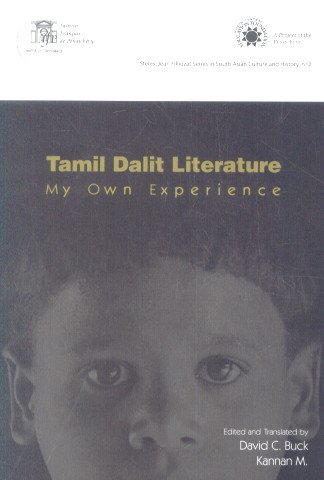Edited Translated David Buck Kannan (1 results)
Product Type
- All Product Types
- Books (1)
- Magazines & Periodicals
- Comics
- Sheet Music
- Art, Prints & Posters
- Photographs
- Maps
-
Manuscripts &
Paper Collectibles
Condition
- All Conditions
- New
- Used
Binding
- All Bindings
- Hardcover
- Softcover
Collectible Attributes
- First Edition
- Signed
- Dust Jacket
- Seller-Supplied Images
- Not Printed On Demand
Seller Location
Seller Rating
-
Tamil Dalit Literature : My Own Experience
Published by Institut Francais de Pondichery, 2011
ISBN 10: 8184701861ISBN 13: 9788184701869
Seller: Vedams eBooks (P) Ltd, New Delhi, India
Book
Soft cover. Condition: As New. Contents: Acknowledgements. Introduction. Translations. Map. Works Cited and Selected Bibliography for Further Reading. Dalit Literature has arrived in Tamil, and it has come of age. Until the past twenty or thirty years, Dalit people in India, traditionally the recipients of some of India s worst discrimination and oppression, did not have much of a literary voice. Now, however, there are voices representing millions of ? Dalits-people who certainly do speak for themselves, but many of whom cannot write for themselves, and would not be published if they did. Further, as Bama says everyone now acknowledges that for the past few years Dalit writings have had an enormous impact on society. Clearly, the issues raised by Dalit voices do matter, on both a national and an international stage. Some of those voices, translated from Tamil into English, are contained in this volume, along with an extensive introduction. Each of the nine Dalit authors collected here has contributed an essay on his or her own experience as a Dalit writer; seven of them also contributed previously unpublished short stories or poems. Their works often display an in-your-face character, but there are also subtle nuances and carefully drawn characters and situations. Dalit literature is fresh and new, and old and stale, all at the same time. It arises directly out of lived experiences in an unjust world. A Dalit writer has to have firm convictions, and critique society through his creations, and be must not sell out to the powers that be. Dalit literature is not for the ladies and the gentlemen of this world. In the Tamil context, the moment a writer thinks be is free to be himself, he is arrested. And when he raises his voice against his arrest, he is strangled. When he expresses his anger, his eyes are plucked out. And when he runs away form this situation, his legs are broken. They haul out, from some old forgotten files, a place where he said he has a determined heart, and then they stab him right in his heart. But there is not really much use in doing that, since it s so easy to stab a crippled heart. Amongst these atrocities and struggles, the voice of the descendents of the drawn-and-quartered ecboes everywhere in vengeance. The Dalit writer who travels down the paths carved out by these echoes is undertaking a journey on which he expects to face challenges.


